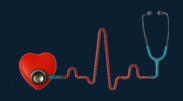




Cardiology Topics
Angina Chest Pain What is angina?
HeartHub is the American Heart Association's patient portal for information, tools and resources about cardiovascular disease and stroke. Here you will find a wealth of information to help you understand and manage your health. Clicking these links will take you to their website.
Arrhythmia Abnormal heart rhythms
Cardiac Rehab teaches you about your heart condition and how to make changes to improve your health.
Diabetes People with diabetes are two to four times more likely to develop cardiovascular disease. Learn how to reduce your risk.
Heart Attack Learn the warning signs.
High Blood Pressure Get the facts on high blood pressure - the 'Silent Killer'.
Peripheral Artery Disease (PAD) People with PAD have a four to five times higher risk of heart attack or stroke. Learn how to diagnose and treat it.
Stroke Stroke is a medical emergency. Know the warning signs.
Heart Hub Video Library Helpful videos on Cardiovascular Conditions, Prevention & Treatment, getting Healthy, CPR and Emergency Care.
Helpful Tools:
Blood Pressure Tracker Record and track your blood pressure.
The Heart Profiler Sign in and create your FREE personalized profile. It's 20 minutes toward a better understanding of your heart treatment options. By registering, you or a loved one can become more involved in your care by reviewing treatment options, possible side effects, success rates and questions to ask your healthcare provider. You also have access to medical journal articles and research studies written in an easy-to-understand format.
Angina Pectoris
What is angina pectoris?
Angina pectoris is the medical term for chest pain or discomfort due to coronary heart disease. Angina is a symptom of a condition called myocardial ischemia. It occurs when the heart muscle (myocardium) doesn't get as much blood (hence as much oxygen) as it needs. This usually happens because one or more of the heart's arteries (coronary blood vessels that supply blood to the heart muscle) is narrowed or blocked. Insufficient blood supply is called ischemia.
Angina also can occur in people with valvular heart disease, hypertrophic cardiomyopathy (this is an enlarged heart due to disease) or uncontrolled high blood pressure. These cases are rare, though.
Typical angina is uncomfortable pressure, fullness, squeezing or pain in the center of the chest. The discomfort also may be felt in the neck, jaw, shoulder, back or arm. Many types of chest discomfort aren't related to angina. Acid reflux (heartburn) and lung infection or inflammation are examples.
When does angina pectoris occur?
Angina often occurs when the heart needs more blood. For example, running to catch a bus could trigger an attack of angina while walking might not. Angina may happen during exercise, strong emotions or extreme temperatures. Some people, such as those who experience coronary artery spasm, may have angina when they're resting. (See below, unstable angina, Prinzmetal's or variant angina pectoris.)
Angina is a sign that someone is at increased risk of heart attack, cardiac arrest and sudden cardiac death.
What is stable angina?
People with stable angina (or chronic stable angina) have episodes of chest discomfort that are usually predictable. They occur on exertion (such as running to catch a bus) or under mental or emotional stress. Normally the chest discomfort is relieved with rest, nitroglycerin or both.
People with episodes of chest discomfort should see their physician for an evaluation. The doctor will evaluate the person's medical history and risk factors, conduct a physical exam, order a chest X-ray and take an electrocardiogram (ECG). Some people will also need an exercise ECG (stress test), an echocardiogram or other tests to complete the diagnosis.
What is unstable angina?
In people with unstable angina, the chest pain is unexpected and usually occurs while at rest. The discomfort may be more severe and prolonged than typical angina or be the first time a person has angina. The most common cause is reduced blood flow to the heart muscle because the coronary arteries are narrowed by fatty buildups (atherosclerosis). An artery may be abnormally constricted or partially blocked by a blood clot. Inflammation, infection and secondary causes also can lead to unstable angina. In a form of unstable angina called variant or Prinzmetal's angina, the cause is coronary artery spasm.
Unstable angina is an acute coronary syndrome and should be treated as an emergency. People with new, worsening or persistent chest discomfort should be evaluated in a hospital emergency department or "chest pain unit" and monitored carefully. They're at increased risk for:
1. Acute myocardial infarction (heart attack).
2. Severe cardiac arrhythmias. These may include ventricular tachycardia and fibrillation.
3. Cardiac arrest leading to sudden death.
What is variant angina pectoris (Prinzmetal's angina)?
Variant angina pectoris is also called Prinzmetal's angina. It usually occurs spontaneously, and unlike typical angina, it nearly always occurs when a person is at rest. It doesn't follow physical exertion or emotional stress, either. Attacks can be very painful and usually occur between midnight and 8 a.m.
Variant angina is due to transient coronary artery spasm. About two-thirds of people with it have severe coronary atherosclerosis in at least one major vessel. The spasm usually occurs very close to the blockage.
Better Heart Health
Board Certified in Cardiology & Internal Medicine and Committed to
Prevention, Risk Factor Modification, Early Detection and Prompt Treatment!
The Keys to a Healthy Heart
Trust a Board Certified Physician to help You Achieve & Sustain Optimim Heart Health
Joseph A. Sarnelle MD | 812 Poole Ave. Suite C Hazlet, NJ 07730 | 732-264-3131
Copyright 2010 Joseph A. Sarnelle, MD: Cardiology New Jersey. All Rights Reserved.
